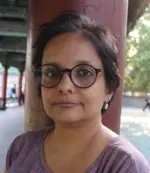Dr. Qudsiya Contractor
qudsiya.contractor@uni-erfurt.deAlumna (Max-Weber-Kolleg für kultur- und sozialwissenschaftliche Studien)
Kontakt
Max-Weber-Kolleg (Steinplatz 2) / Raum 310 (2. OG)
Sprechzeiten
nach Vereinbarung
Besucheranschrift
Max-Weber-Kolleg für kultur- und sozialwissenschaftliche Studien
Campus
Nordhäuser Str. 63
99089 Erfurt
Postanschrift
Universität Erfurt
Max-Weber-Kolleg für kultur- und sozialwissenschaftliche Studien
Postfach 90 02 21
99105 Erfurt

Zur Person
Qudsiya completed her PhD in 2014 as a Max Planck Institute Doctoral Fellow at the School of Development Studies, TISS. She has held teaching positions at the Tata Institute of Social Sciences, Mumbai and Institute for Social and Economic Change, Bangalore. She has also worked in the development sector on issues of urbanization, displacement and human rights.
Forschungsprojekt
My project within the ‘Religion and Urbanity’ research group at the Max Weber Centre will explore how religion and religious identities impact the urban experience of the poor in Mumbai. The project will specifically focus on the Muslim poor in a Mumbai neighborhood exploring how socio-spatial segregation, lack of basic amenities, economic deprivations, police surveillance and political marginalization play out in everyday life. Mumbai is among India’s most modern cities known for its economic prosperity, cosmopolitanism as well as public displays of religiosity. Since the early twentieth century, with the rise of political Hinduism, the cultural and political landscape in the city has demonstrated the salience of religious majoritarianism as a way of defining nationalism and an assertion of vernacular pride. Its image as a secular modern city has been under threat with incidences of communal strife that have segregated its cultural and spatial form. Violence following the demolition of the Babri Masjid in Ayodhya (1992-93), an event that shook the city’s social fabric lead further to segregated living and a social avoidance of Muslims that percolated Mumbai’s neighbourhoods. Post 1992-93, Mumbai’s Muslim neighbourhoods have been understood as ridden with state apathy and havens of religious orthodoxy. This research focuses on the dynamics and experiences of being a Muslim on the urban margins in the aftermath of communal violence.
Publikationen (Auswahl)
- 2018 Muslim women, caste and the beef ban in Mumbai, in Anupama Rao (ed.) Gender, caste and the imagination of equality, New Delhi: Women Unlimited, 293-309.
- 2017 Muslim Women and the Challenge of Religion in Contemporary Mumbai, Economic and Political Weekly (Special Issue on Review of Women Studies), 52 (42-43), 81-87.
- 2017 “Jab Babri Masjid Shaheed Huyi”: Memories of Violence and Its Spatial Remnants in Mumbai in N. Jayaram (ed.) Social Dynamics of the Urban. Exploring Urban Change in South Asia, New Delhi: Springer, 135-151.
- 2017 Remaking the mohalla: Muslim basti-dwellers and entrepreneurial urbanism in Mumbai’ in S. Kanekanti (ed.) Entrepreneurial Urbanism in India, New Delhi: Springer, 137-155
- 2016 ‘Institutionalising peace? – Mohalla committees in Contemporary Mumbai’, in Hugo Gorringe, Roger Jeffery and Suryakant Waghmore (eds.) From the margins to the mainstream: Institutionalising minorities in South Asia, New Delhi: Sage, New Delhi, 201-228.
- 2015 On the madness of caste – Dalits, Muslims and normalised incivilities in neoliberal India (co-author) in Brij Mohan (ed.) Global frontiers of social development in theory and practice, New York: Palgrave-Macmillan, 223-240.
- 2012 Quest for water - Muslims at Mumbai's periphery. Economic and Political Weekly, 47 (29), 61-67.
- 2012 ‘Unwanted in my city’ – The making of a ‘Muslim slum’ in Mumbai, in Gayer, L. and Jaffrelot, C. (eds.) Muslims in Indian cities – Trajectories of Marginalisation, London: Hurst & Co., 23-42.
- 2012 Saranchatmak hinsa aur swasthya ke pratiched: Jatiya hinsa aur daliton ke bahishkaran par kuch vichar (co-author) in Imrana Qadeer (ed.) Dalit Mahilaon ka Swasthya evam Adhikar, New Delhi: Penguin, [In Hindi] 260-271.

